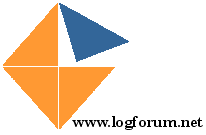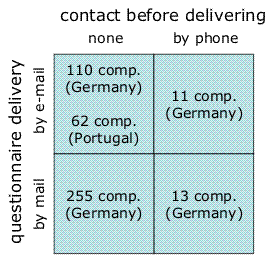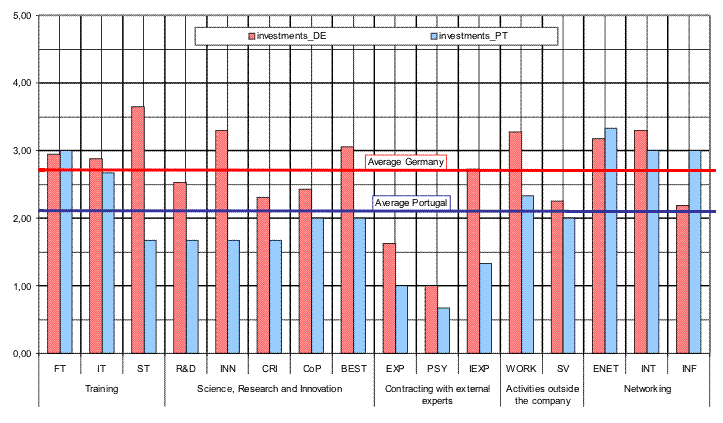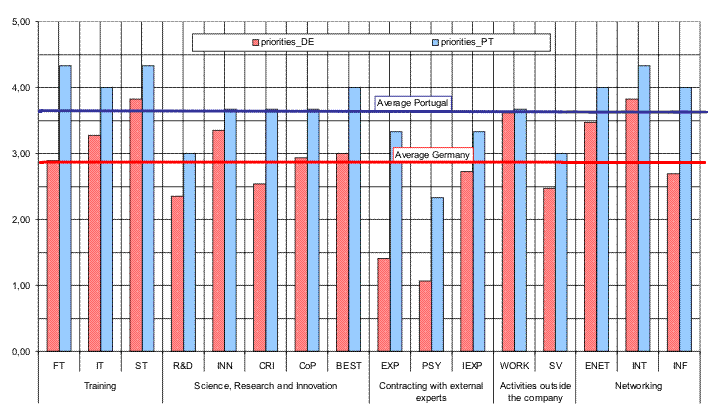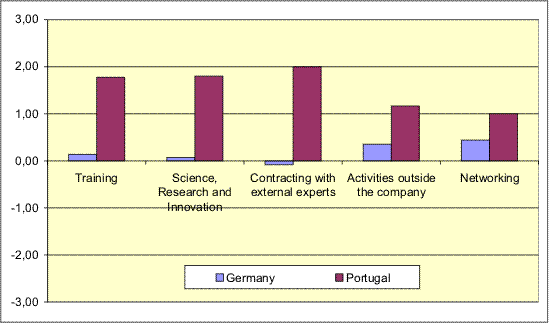|
|
|
KNOWLEDGE MANAGEMENT AND LOGISTICS: WHERE WE ARE AND WHERE WE MIGHT GO TO Gaby Neumann1, Eduardo Tomé2 ABSTRACT By the commonly accepted theory, today's logistics processes and systems are characterized by an increasing complexity and by the need for global networking to cope with the growing diversity of logistics problems; because of this, knowledge is becoming more and more a strategic resource in logistics. KNOWLEDGE MANAGEMENT: AN INTRODUCTION In the last decade, as a logical consequence of the changing organizational structures and of the changing relations within and between companies, the new roles for managers and employees, and the new international division of labour, knowledge has been seen as a new strategic resource. This development finds its expression in the numerous projects and research activities on how to deal with the knowledge resource and how to gain, retain and distribute it, as well as on requirements, potentials and concepts for running a company in a knowledge-oriented way - all of this summarized by use of the term knowledge management. Therefore, knowledge management describes the conscious, systematic and strategically anchored handling of knowledge considering people, organization and technology in order to encourage individual, social and organizational learning processes in the end leading to a learning and knowledge-based organization (Reinmann-Rothmeier et al. 2001). Initially, companies had high expectations on all activities aiming to manage knowledge:
New employees should more easily and in shorter times be integrated into the company environment and tasks. This led to significant investments, mainly targeted towards the introduction of technical solutions like e.g. knowledge banks. But in practice, the intended economic success was not achieved within short terms and many of those projects or initiatives for knowledge management implementation into a specific company setting have significantly been reduced or even completely cancelled. Here, the fact that knowledge management requires a holistic approach including all three of its dimensions (i.e. people, technology and organization) and eventually initiates change processes usually showing effects in medium to long terms has erroneously been ignored. Therefore (and as it is typical for practically implementing technical innovations and concepts), a phase of excessive expectations from knowledge management was followed by a phase of strong disillusionment on its power. Further introduction of knowledge management methods and approaches into company practice as well as further identification of new application areas were slowed down or even prevented. LOGISTICS: APPLICATION AREA FOR KNOWLEDGE MANAGEMENT CONCEPTS The same hesitant implementation of knowledge management in a company's practice as described above can also be found in the logistics business area. Here, knowledge has been widely recognized and accepted as strategic resource, too:
Consequently, knowledge management is expected to provide a tremendous contribution to the improvement of logistics planning and performance. To learn from previous experience, to know about valuable experts, their location and expertise for getting them involved in running projects or new tasks, to better understand pre-conditions, settings and decisions from the past and with relevance to today's activities, to easily identify and get access to the right knowledge exactly when it is needed - these are some important sources for increasing a person's, a team's or an organization's logistics competence and performance and to let them become more knowledgeable consumers, well acquainted supervisors or enthusiastic developers of logistics services, systems and processes. The biggest challenge for properly handling logistics knowledge by applying knowledge management methods and tools to the planning of logistics systems and processes and to the operation of logistics services consists in providing the right knowledge of the right quality and with the right costs at the right place and time. In other words, it is essential not to focus on the introduction of knowledge management technology and integration of software tools for storing and retrieving knowledge and information into a company's setting only (Gudehus 2003), but to put the human resources driving the company's performance back into the center of gravity and to try to give them that kind and amount of support which is needed in a particular situation. In fact, the quality of the logistics services and the success of the logistics activities strongly depend on the knowledge, skills and abilities (i.e. the competence) of the people that design or operate the logistics systems and processes. Therefore, knowledge management can be expected to be an essential method, tool, and principle for improving the people's performance in logistics, and consequently, for improving the outcome, i.e. the quality of logistics systems, processes and services. Preconditions of the knowledge management success are sophisticated knowledge management systems tailor-made to the specific needs of a particular company, supply chain collaboration or even network of companies, and also a knowledge-friendly environment in this frame. Despite of this common understanding, knowledge management has not yet been implemented in logistics companies or logistics departments of big companies in large scale. Although (Baumgarten and Thoms 2002) were able to identify logistics knowledge management champions (with special focus on those companies involved in supply chain networks), they also had to recognize severe challenges in implementing knowledge management and running it in the daily logistics business. Major problems were seen in financial limitations, time restrictions, insufficient structuring and presentation of knowledge, as well as methodical misconceptions. Other problems are related to indicators and impact measurement: indicators characterize the suitability and appropriateness of knowledge management tools and systems like the amount of knowledge units stored or access rates and response times. The latter aspect is represented by categories such as trust or intelligibility and so, it is very difficult to be measured. Probably, this missing economic measurement is another reason for acceptance problems and the slack implementation of knowledge management into logistics services planning, operation and management. KNOWLEDGE MANAGEMENT AND LOGISTICS: SETUP OF AN EMPIRICAL IMPACT STUDY Aims and setting Taking into consideration the current situation of the introduction of knowledge management into the logistics field of business, a study was run to compare the high expectations on what knowledge management could do with today's reality. In particular it aimed:
Specifically, we expected to obtain descriptions of knowledge investments, needs for investments in knowledge and impacts related to knowledge in the logistics sector. For this, we designed a sectorial impact study rather than a case study (Neumann and Tomé 2005). With this, we differ from other studies that already have been run in the field. Those studies did not focus on understanding the impact of knowledge management on a company's performance as well as related needs and investments, but aimed, for example, to identify the relevance of certain knowledge management methods in today's supply chains (Strubelt and Neumann 2006), the state-of-the-art in knowledge management implementation and in using knowledge management tools in companies and organizations (Fraunhofer 2005), or the success factors of computer-mediated knowledge systems in an international technical consulting firm (Reihlen and Ringberg 2006). The study has purposefully been designed as a three-stage process. After having gained first results and general feedback from a limited sample of logistics companies in Germany by use of a prototype questionnaire (stage 1 - Neumann and Tomé 2005), an improved questionnaire was sent by mail or e-mail to 389 companies in Germany and 62 companies in Portugal attaching themselves to the logistics sector (stage 2). Those companies were either logistics service providers of various kinds or, for example, big companies such as car manufacturers with a specific logistics department. In order to ensure a useful number of responses, they have been approached in different ways and even pre-contacted by phone before sending off the questionnaire (Figure 1). In order to eventually detect cultural influences, the study was less focused on global players, and more centered on German and Portuguese companies with a strong orientation towards regional and national markets; in addition, the questionnaire was provided in the respective local languages. In future, stage 3 of the project will aim to extend the investigation to further countries across Europe.
Questionnaire To originate the intended insights, the questionnaire comprised five groups of questions addressed to different responsible managers in a company:
Through its special design, this questionnaire was expected not only to provide a snapshot of the company's current way of handling knowledge, but also, and more importantly, to allow concluding on cultural changes and developments related to knowledge management. For this, all responses, no matter if they were positive or negative ones, have been treated carefully in both ways question-by-question and as subject of an interrelated analysis. KNOWLEDGE MANAGEMENT AND LOGISTICS: CURRENT SITUATION AS APPEARING IN THE STUDY Response rate As previously explained 389 German and 62 Portuguese companies received the questionnaire in electronic or printed versions. The overall response rates (in terms of completed questionnaires) of 4.6% in Germany (equally distributed between small, medium-sized and large companies) and 4.8% in Portugal were slightly disappointing and do not allow drawing any statistically significant conclusions. Nevertheless, some qualitative results and general findings can be derived from this:
On the other hand, companies, which responded to the questionnaire, showed a strong interest in learning about results and outcomes of the study and welcomed some benchmarking of their own knowledge management activities and eventually existing further potential. In Germany, this is particularly true for small to medium-sized consulting companies with a high percentage of well-educated employees (university degree). The role of knowledge in the company Nearly all respondents declared knowledge was a key resource for the company's performance: more than 75% of the responding companies (at least in the logistics managers' opinions) characterize knowledge management as supportive to all activities and helpful to better perform at the market; furthermore knowledge changes and improves all the time (in more than 60% of the cases) and/or develops with particular activities such as projects (in 50% of the cases). This one is a quite surprising and very positive view on knowledge, which also explains why those companies finally responded to the questionnaire. On the other hand, nearly none of the companies confirmed the production of an intellectual capital report to monitor developments of the company's knowledge base. Those disagreeing with that statement describe to have only rudimental experience with this management instrument so far, that it often fails in the daily business, or even that the term "intellectual capital report" or "knowledge audit" is not yet established. This represents the other much less enthusiastic and much more hesitant attitude towards knowledge management detected in this study, and a probable explanation for the low participation rate. Investments into knowledge management activities On the scale from 0 (no investments) to 5 (very big investments) the average level of investment of companies per item was rated 2.69 in Germany and 2.06 in Portugal. From this finding we may conclude that in 2004, German logistics companies invested into knowledge management at a medium level, whereas Portuguese ones just reached a low level. However, two other findings help to clarify this average description of the situation (see Figure 2):
Priorities of accessing knowledge management activities In contrast to the investment level and using the same scale, the Portuguese companies felt a higher priority for investing into knowledge management than German companies did (average of 3.67 and 2.87 respectively; see Figure 3). The difference may be explained because German logistics companies already made the investments the Portuguese still lack.
Per item, the average priority was 2.98 with heavily varying results for the different knowledge management activities: nine items showed an average priority above 3, with the highest values (between 3.5 and 4 - meaning nearly high priority) being registered for self-training, participation in conferences/workshops, participation in external knowledge-sharing networks or establishment of internal knowledge-sharing networks. In contrast, hiring of consultants in HRD, IC, or knowledge management, and meetings with labour psychologists had very low values of less than 2 (i.e. low to very low importance). Needs for knowledge management This part of the study intends to help companies in identifying knowledge management areas in which they shall invest in the near future and may thus have a short run and important consequence. Based upon (Reinhardt 2003) we consider that the need for investment in knowledge is defined as difference between, on one hand, the priority for accessing knowledge in a certain way and, on the other hand, an indicator of access frequency. As an indicator of frequency we use the investments made. Crucially, we think it is much more interesting and correct to define "needs" - as we did - indirectly by asking for "frequencies" and "priorities" than naively asking a manager this question directly: needs are potentially infinite if we look at them directly. A first impression on the companies' needs is given by Figure 4, which visualizes the shift in ratings for each category of knowledge management activities between 2004 and 2005. Here, any positive value indicates a higher priority than investment (meaning that urgent need for investment exists is these sub-areas), while any negative value shows that priorities do not justify investments made (and thus a reduction of investment might be recommended in these cases).
More precisely, on a scale from -5 (over-investment, i.e. strong need for reducing investment) to +5 (urgent need for investing further) we found that the indirectly perceived average need for becoming active per knowledge management item is small even if it exists (+0.4), but that in Portugal (+1.6) this need is much higher than in Germany (+0.16). The difference between the two countries is probably explained by the different levels of economic development and by the different levels of implementation of knowledge management in their logistics sectors. Other details give more realism to that generic finding:
Therefore it is possible to conclude that even if on average the needs for investing into knowledge management are small, several situations of under-investment and of unsatisfied needs exist - the first being essentially located in Germany and the latter in Portugal. KNOWLEDGE MANAGEMENT AND LOGISTICS: THE IMPACT In recent years some very well known models have been developed to deal with the question of economically evaluating knowledge management and Intellectual Capital, the more important ones being the Skandia Navigator (Edvinsson and Malone 1997), the Intangible Assets Monitor (Sveiby 1997), and the Balanced Scorecard (Kaplan and Norton 1994). The main ideas behind those models are two: first to define the "intangible" assets and second to measure their implications - just because knowledge is intangible, this does not mean that its impact is (APQC 2004a). Those models assume the diversity and complexity of the notion of knowledge. Furthermore, they also assume the diversity and complexity of the consequences from using knowledge. It is assumed that those results may be positive in a number of perspectives like business processes, employee satisfaction, costumer satisfaction, financial results, learning and growth (North and Hornung 2003). Applications of those models have been done for companies and organizations (Mertins et al. 2001; Kagelmann 2003; Kukko et al. 2003; North, Reinhardt and Schmidt 2004) but also for countries and regions (Bonfour and Edvinsson 2004). Also, and very interesting, some authors have tried to audit knowledge (Reinhardt 2003; Sabater et al. 2003). All those ideas are well known, and studied. What has to be done now is to apply them to relevant sectors, which in the present case is the logistics sector. A very simple equation could be used to describe the presented study (Neumann and Tomé 2005): Y = aX +bKM + e (1) Here, Y represents the outcomes, KM the investment variables (the tool), and X the controls. The controls would be related to sectors, quality of human capital and other relevant characteristics of the company. The impact of knowledge management would be defined by b. Finally, variable a represents a set of coefficients associated with controls and variable e corresponds to the statistical error and also to the non-observable variables. Very complex developments of this formula may be made (Heckman et al. 1999). Of course, one question could arise: is it the tool (KM) that fails, or is it people who do not know how to use it properly? But this is a secondary problem. The first one is to access somehow the impact of knowledge management on a company's logistics performance. For this, we applied the equation by estimating regressions using the 32 company performance indicators as dependent variables and the 16 knowledge management activities as independent variables. On this basis we were able to extract the following main conclusions:
Due to small sample of companies that responded to the questionnaire we understand these results as very preliminary ones. Nevertheless, from what we obtained we only can conclude that knowledge management has a small importance in defining a companies' economic evolution. But this finding is in quite some contradiction to theory on one hand and all enthusiastic expectations from practice on the other. So, what is the truth? Of course, we hope that a bigger sample, in a more advanced step of the study, will allow detecting some more meaningful relations between knowledge management and company performance. On the other hand we also have to take into consideration that the effects caused by introducing a knowledge-friendly culture and knowledge management methods into a particular company or even throughout the entire supply chain will mainly be brought out in longer terms. Consequently, this requires a corresponding setup of the study using our results achieved so far as first benchmark to be subject to further investigations repeated at regular intervals and continually analyzed according to impacts and sensitiveness between knowledge management items and logistics performance indicators. KNOWLEDGE MANAGEMENT AND LOGISTICS: SOME PROSPECTS In theory, knowledge management is expected to provide a tremendous contribution to the improvement of logistics planning and performance. The presented study aimed at comparing these high expectations with today's reality in business. The focus was set not just at analyzing and measuring what is happening, but also at developing a set of best practices and suggestions for effectively and efficiently integrating knowledge management into different types of logistics activities. Due to the small number of respondents, and regretfully, the findings of this study cannot be considered very significant by now, but anyway, the paper contributes to the discussion about the use and importance of knowledge management in companies. Summarizing our findings, the main conclusion of the study is that knowledge management still seems to be just of little importance in the logistics sector in Germany and Portugal. We base this conclusion on the following observations:
This conclusion is disappointing. But in contrast to this and quite interestingly, all of the responding companies considered knowledge extremely important. They also showed a strong interest in learning about and from the outcomes of the study. This indicates that despite of all the disillusionment that global empirical findings provoke, the role of knowledge and the fact that application of knowledge management can bring some good effects are indisputable. The problem simply seems to be a lack of knowledge and understanding with the companies on how to implement knowledge management methods in a customized way. The fact that, for example, intellectual capital reports are seldom produced or even unknown at all, serves as indicator of this statement. The way to overcome this problem is to provide companies with respective information and eventually lend them a hand in managing their human resources, selecting technology or changing the organization. Furthermore, a number of cultural or much more economically influenced differences between the levels of knowledge management maturity in German and Portuguese logistics companies turned out: In Portugal the investment in knowledge still seems to be much smaller than in Germany, whereas providing employees with access to knowledge in one or the other way is felt much more important. Consequently, with the Portuguese companies a much stronger need for investments into knowledge and knowledge management activities could be detected than with the German ones. And even more, these needs are not just significantly higher in Portugal, but they also cover more or less all kinds of knowledge management activities we were asking for. In contrast to this, German companies showed the strongest needs (at much lower level than the Portuguese companies) with those activities related to individual initiatives of the human resources outside formal structures, like e. g. self-training or sharing of best practices in informal networks. Looking a bit more in detail at the individual knowledge management activities, again some clear difference have been identified according to investment levels, priorities and needs for investments:
Although the companies' individual levels of investment and needs per item were widely varying, these average results allow to derive suggestions for fields of activities the main focus should be put on or for knowledge management projects the companies should start with. To generalize, the companies require and favour their employees' own initiatives for gaining, deepening, updating knowledge (which eventually would cost the company the least), but they also should be aware of their responsibility to provide their human resources with some freedom and time for the networking, best-practice sharing or learning activities they expect from them to the benefit of the company. From the scientific point of view, the main message of the paper is that even if scholars consider that knowledge management and knowledge are of paramount importance in the world of today, this idea is far away from being put into common practice. That realization should bring out further studies on the use of knowledge management in society and on its implications. The biggest weakness of the study presented in this paper is the scarce number of responses. Therefore, further efforts will be spent on extending the study to other European countries (stage 3 of the project) to achieve a bigger sample of companies insight the logistics sector. Finally, even the current results are still subject to an ongoing analysis to more clearly demonstrate similarities and differences between the German and Portuguese companies, but also to better understand the impact knowledge management has on a company's logistics performance. This might also open up the possibility to run a similar project within another business sector and to compare the results with those from the logistics sector. REFERENCES APQC - American Productivity and Quality Center, APQC, 2004. Knowledge Management; [on-line] http://www.apqc.org/portal/apqc/site/generic?path=/site/km/overview.jhtml Baumgarten H., Thoms J., 2002. Trends und Strategien in der Logistik - Supply Chains im Wandel. Berlin 2002. Trends and strategies in logistics - supply chains in change. In German. Edvinsson L., Malone, M., 1997. Intellectual Capital. Harper Business. Fraunhofer-Wissensmanagement Community, eds., 2005. Wissen und Information 2005. Fraunhofer IRB; Stuttgart. In German. Gudehus T., 2003. Der Einfluß des Menschen auf die Leistungsfähigkeit von Logistiksystemen; Proc. 12. Deutscher Materialfluss-Kongress, VDI-Berichte 1744, VDI Verlag, Düsseldorf, 281-289. Heckman J., Smith J., Lalonde R., 1999. The economics and econometrics of Active Labour Market Programs; O. Ashenfelter and R. Lalonde (eds), Handbook of Labour Economics, vol 3A, chapter 31; North Holland, 1865 - 2097 Kaplan R.; Norton D., 1994. The Balanced Scorecard. Harvard Business School, Boston. Neumann G., 2001. Learning by Planning: How to Improve Logistics Planning Competencies. D. Ziems (ed.), Logistikplanung im e-Zeitalter (logistics planning in the e-age), proc. 7. Magdeburger Logistiktagung; Magdeburg, Germany, November 15-16, 217-232 Neumann G., Krzyzaniak, S., Lassen, C. C., 2001. The Logistics Knowledge Portal: Gateway to More Individualized Learning in Logistics. Proc. ED-MEDIA 2001 - World Conference on Educational Multimedia and Hypermedia; Tampere, Finland, June 25-30. Neumann G., 2003. Framework for Integrating Knowledge Management into Personalized Problem Solving; Proc. I-KNOW '03 - 3rd International Conference on Knowledge Management; Graz, Austria, July 2-4, 500-506. Neumann G., Tomé E., 2005. Knowledge Management and Logistics: An Empirical Evaluation; Proc. I-KNOW '05 - 5th International Conference on Knowledge Management; Graz, Austria, June 29-July 1, 96-103. North K, Hornung T., 2003. The Benefits of Knowledge Management - Results of the German Award "Knowledge Manager 2002"; Proc. I-KNOW '03 - 3rd International Conference on Knowledge Management; Graz, Austria, July 2-4, 302-310. North K., Reinhardt R,. Schmidt A., 2004. The Benefits of Knowledge Management: Some Empirical Evidence. OKLC 2004, Innsbruck Austria, [on-line] http://www.ofenhandwerk.com/ oklc/Prog12.html#a8 Reihlen M., Ringberg T., 2006. Computer-Mediated Knowledge Systems in Consultancy Firms: Do They Work? R. Greenwood, M. McDougald, R. Suddaby; Professional Service Firms (Research in the Sociology of Organizations, Volume 24). JAI Press: Greenwich, Connecticut, London. 307-336. Reinhardt R., 2003. Theoretical Basis of a Knowledge Audit: An Integrative Measurement Approach; Proc. I-KNOW '03 - 3rd International Conference on Knowledge Management; Graz (Austria), July 2-4, 389-397. Reinmann-Rothmeier G., Mandl H., Erlach C., Neubauer A., 2001. Wissensmanagement lernen. Beltz: Weinheim und Basel. In German. Sabater R., Moreno A., Sanz R., Jimenez D.j Lopez C.j Cegarra J., 2003. Knowledge Management and Intellectual Capital Audits: The Strategy Model; Proc. I-KNOW '03 - 3rd International Conference on Knowledge Management; Graz (Austria), July 2-4, 406-14. Strubelt H., Neumann G., 2006. Requirements for Knowledge Management Support to Implement ECR in Practice; MSL - Magdeburger Schriften zur Logistik; 23, 47-57. Sveiby K. E., 1997. The new organizational wealth. San Francisco: Berret-Koehler. WIEDZA O ZARZĄDZANIU I LOGISTYCE: GDZIE JESTEŚMY I CO MOŻEMY OSIĄGNĄĆ
STRESZCZENIE Zgodnie z ogólnie przyjętą teorią, występujące dzisiaj procesy i systemy logistyczne charakteryzują się wzrastającą kompleksowością oraz biorąc pod uwagę efekt globalizacji, z rosnącą różnorodnością procesów logistycznych. Z tych też powodów, wiedza jest coraz bardziej stategicznym zasobem w logistyce. WISSENSMANAGEMENT UND LOGISTIK: WO WIR STEHEN UND WOHIN DIE ENTWICKLUNG GEHEN KÖNNTE
ZUSAMMENFASSUNG. Es ist eine allgemein akzeptierte Theorie, dass Logistikprozesse und -systeme heutzutage durch zunehmende Komplexität und die Notwendigkeit einer globalen Vernetzung charakterisiert sind, um die wachsende Vielfalt an logistischen Aufgaben bewältigen zu können. Aus diesem Grund wird auch in der Logistik das Wissen immer mehr zu einer wettbewerbsrelevanten strategischen Ressource. Allerdings sind in diesem Zusammenhang verschiedene Fragen noch unbeantwortet: Wie steht es um die Implementierung von Wissensmanagement-Methoden in die logistische Praxis? Inwieweit stimmt die vermeintliche (theoretische) Relevanz von Investitionen in Wissen und Wissensmanagement mit der tatsächlichen, in entsprechenden Investitionsvolumina gezeigten Priorität verschiedener Wissensmanagement-Aktivitäten überein? Wie verändert sich die (logistische) Unternehmensperformanz infolge wissensbezogener Investitionen?
Gaby Neumann |
Copyright © 2005 LogForum, Wyższa Szkoła Logistyki, ul.E.Estkowskiego 6, tel. 061 852 95 55, 851 06 04, tel./fax. 061 851 06 03 |
